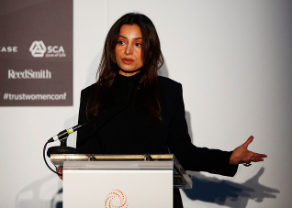Of Women and Laws
Today I had the privilege to attend a talk on violence against women as part of a two-day event organised by The Thomson Reuters foundation.
The Trust Women Conference saw the gathering of people at the forefront of the issue worldwide: lawyers, members of NGOs, human rights activists, documentary film makers, politicians and journalists.
In a short clip, figures on rapes, domestic violence and prosecutions in South Africa, India, the UK and the United States, flashed on the screen, each of them reinforcing the harsh reality faced by too many women often too vulnerable and legally powerless to get their assailants convicted.
Such is the heart-wrenching story of Banaz, narrated to us by Deeyah Khan, a musician and documentary film director (pictured below), who won several awards for her documentary “Banaz - a love story”.
Banaz moved from Kurdistan to the UK with her parents at the age of 8. Aged 17, she was married to a man her uncle and parents had chosen for her and she had to comply. Her husband was abusive. He raped and beat her and when Banaz turned to her family for help, they instructed her to be a better wife to her husband.
Banaz eventually left her husband which “brought shame” on her relatives who after a family council made the decision to murder her. Although fearing for her safety, Banaz, having no support and nowhere to go, stayed at her parents’ home where her dad tried to kill her. She managed to find refuge in a nearby cafe and called the police who came to the conclusion that she was being dramatic.
The next murder attempt on Banaz was sadly successful. One night, a gang of three men commissioned by her relatives entered her house, murdered her in horrendous circumstances and dumped her body in a suitcase.
Over her lifetime, Banaz went to the police 5 times and they failed on 5 accounts to take her plea seriously. While she was unheard while alive, her case was investigated and led to the conviction of her murderers which is an important step.
There are many more girls and young women facing violence from their family and community. The “honour killings” are not a new phenomenon and they need to be addressed with all the force of law and also through better education of children and teenagers at school, and of any members of staff who is susceptible to come across victims: the police, nurses and doctors, teachers and so on.
Only through education, easy access to information and a framework of laws will mentalities start to change worldwide.
Barbaric secular “traditions” do not have their place in any community of any kind and need to be abandoned in favour of a valorisation and emancipation of women. A human being inflicting suffering onto another being, abuse and exploitation, never was acceptable and never will be.

Deeyah Khan - picture from http://www.trustwomenconf.com -
